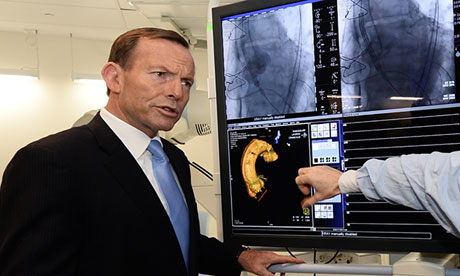
The opposition leader at St Vincent's hospital in Sydney on Thursday. Photograph: Alan Porritt/AAP
Tony Abbott has sought to undermine Labor's allegation that he will slash health by unveiling spending plans worth $340m, with some of the money coming from cuts to health "bureaucracy" but none from frontline services.
Abbott said he was not trying to shake up a system which "in broad terms works well" and pledged to "maintain existing levels of health funding but ensure some money is redirected from bureaucracies to frontline services". He said this meant there would be fewer health bureaucrats but no fewer doctors and nurses.
"We want to make a good system better; the last thing we want to do is impose an overall cut to health funding," he insisted as he unveiled the policy at St Vincent's hospital in Sydney.
The policy leaves open the possibility of a bigger "shakeups" down the track – promising to "review" Labor's Medicare Locals (which co-ordinate medical, hospital and ancillary health services), to remove the means test on the private health insurance rebate when it can be afforded, and to automatically accept the recommendations of an expert panel about which drugs are listed for public subsidy on the pharmaceutical benefits scheme.
It does not contained detailed costings, saying only that its measures will cost $340m over the first four years.
Abbott said the review of Medicare Locals was "to try to ensure we maintain the actual health services while minimising the bureaucracy".
"I'm not going to say no Medicare Local will close, but I am giving an absolute commitment that the overall levels of health funding will be maintained," he said.
Labor leads the Coalition in polling on who voters most trust to manage health and hospitals. The Coalition has not wanted to make it a key election issue.
This policy is not the final word on health from the Abbott team in this campaign, with a mental health policy and possibly some other announcements still to come.
Among the plans announced in Thursday's policy are:
• doubled funding – to $119m – over four years for doctors who help train new general practitioners.
• more community involvement in the management of local hospitals.
• bringing forward the new national bowel cancer screening programme.
• $35m for research on type one diabetes.
• provide 500 extra nursing and allied health scholarships for students and health professionals in areas of need and $40m for 400 medical internships.
The Australian Medical Association welcomed the extra money for local GPs.
0 comments:
Post a Comment